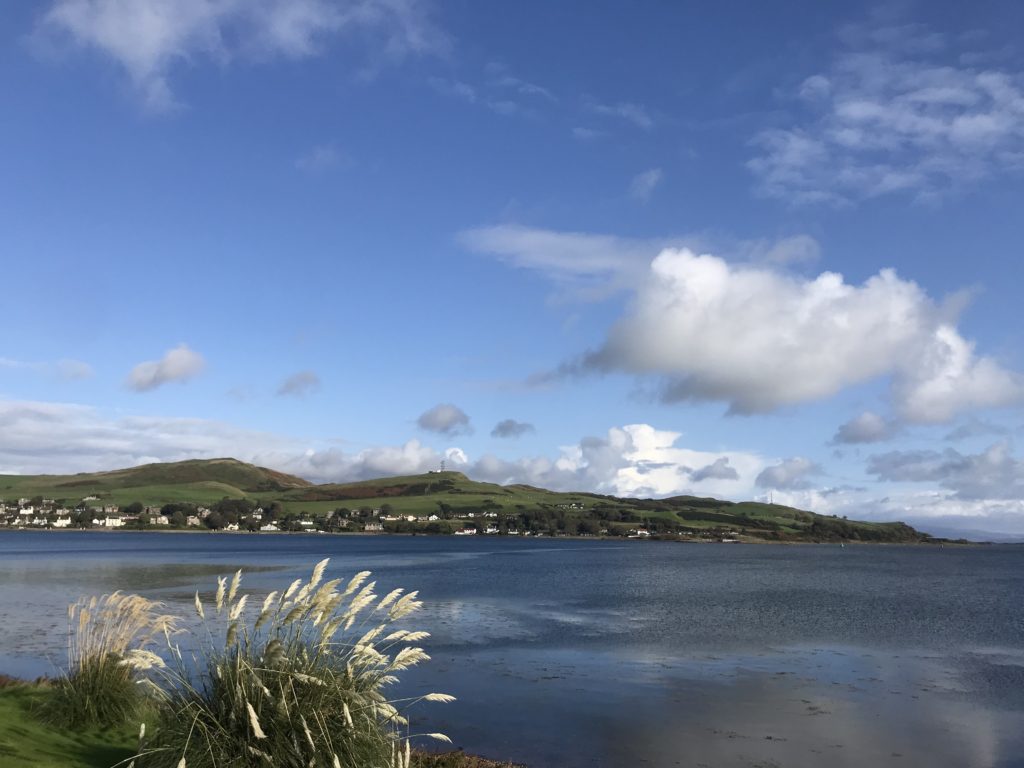By Allison Rapp
I spent close to five months living in Glasgow, Scotland, and close to five months traveling throughout the UK. With nothing but a few university classes to tie me down, I was almost entirely free to move about the country on my own. At the tail end of summer I was still nursing some wounds from a failed relationship, and though I had been planning this trip for nearly a year, picking up everything and moving across the Atlantic suddenly seemed like just the right thing to do.
Glasgow is known for being one of the world’s friendliest cities. Most times, if you ask someone about their favorite part of their trip, they’ll tell you “the people.” The response became so popular amongst tourists that the city announced a new motto: “People make Glasgow.” They hung bright pink banners with those words throughout town.

It’s true, tough as they are, that Glaswegians will give you the shirt off their back if you need it, or more likely, a pint of their locally brewed Tennants lager in a darkened pub. They will order a drink at 10 am and not bat an eye, and they expect it to rain every single day, regardless of the season. They are fiercely proud to be Scotsmen and Scotswomen, and they value tradition. It was refreshing, as an American, to live somewhere that the people are proud to be where they’re from.
But Scotland, and the UK as a whole, is not oblivious to change in the world around it, and has set forth a variety of green initiatives in recent years in efforts to lower emission rates and conserve energy. On an individual level, most Scots, fully aware of the not-so-insignificant fine that could be charged against them for littering, would rather be caught dead than throwing recyclable items in the trash, or worse, throwing them into the street. Every one of them uses their own reusable shopping tote, and the movement to price plastic bags at five pence a piece has been in effect for some time now.

The UK, particularly in comparison to the United States, is doing OK in terms of its attempts to reduce its carbon footprint, but as nearly every resident of a certain age can attest to, Great Britain has a long and embittered history of changing its mind. With the decision now fully in place regarding its departure from the European Union, the UK is now, in essence, back to square one. While it may still opt in to policies as they see fit, this means no more adhering to the environmental regulations of the EU if it doesn’t wish to.
Glasgow is young, vibrant, and quite liberal in its practices and beliefs. In my entire time living there, I didn’t run into one pro-Brexit person, or at least, they didn’t reveal themselves to me. I found much more of the opposite, and the voting proves it. The majority of Scots voted not to leave the European Union and, yet, here they are, forced to leave a community that has provided them with consistency, unity, and a progressive mindset in an increasingly resistant world. Change, in this sense, was not welcome, and most of them view it as a step backwards. They’ve also advocated for a new referendum, one in which Scotland becomes independent from the UK and rejoins the EU on their own, though this is far easier said than done.
For Scotland, a country steeped in rich tradition and love for the land they live on, global climate change has become a serious issue, but at the same time, the political change they see happening hundreds of miles south in London doesn’t seem to reflect the kind of preparation that is required in such a situation. Scotland, it seems, is looking forward for change, while the offices in England are looking back.

When I spoke with Glaswegians, many of them pitied me, saying how awful it must be to live under the jurisdiction of Donald Trump. When I would inquire about their thoughts on Brexit, they would respond in the same way that I’ve become accustomed to hearing Americans speak: with a playful scoff or a witty joke. They’re sincere and passionate about their feelings and will make that known, but sometimes brushing off the gravity of the situation with some sarcastic humor is the only way to keep moving through the chaos.
I moved to Scotland because I needed a change: of pace, of scenery, of attitude. It grew to be home to me, and I came to enjoy walking through the light drizzle of rain to the art museum or the library, or sitting on the train watching sheep farms whizz by. I was welcomed with open arms and a pint, a testament to the Scots’ compassion, but also to their resilience. Embedded in their city crest, the phrase “Let Glasgow Flourish” appears in various places in town. If the climate continues to change, both the environmental and political one, Glasgow, and Scotland as a country, will hopefully not cease to flourish.

Allison Rapp is a freelance journalist whose writing has appeared in various music, culture, and travel publications. She lives in New York City. When not at a concert or spinning her vinyl collection, she can be found on Twitter at @allisonrapp22.
If you like stories about the UK, read: Can Food Nourish Your Soul?
Do you love travel writing? Want to give it a try?

